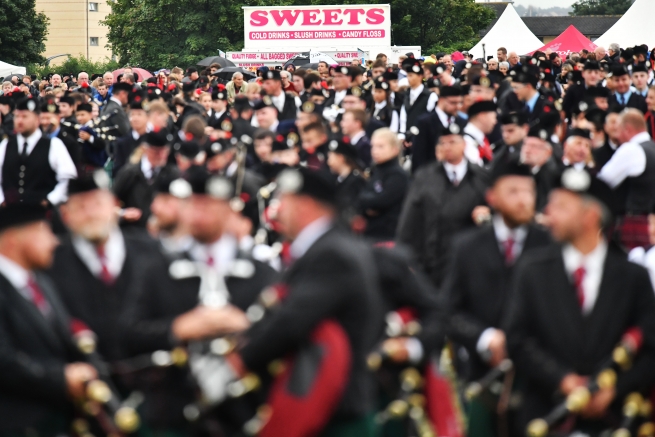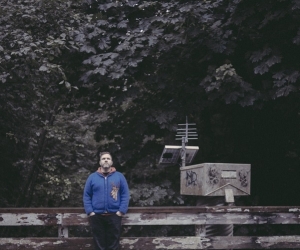
My partner Emily and I moved to Glasgow from Toronto a year ago. The first TV shows we saw included a pipe-band championship and a shepherding competition. Both were brilliant to listen to. We thought that’s what TV was going to be here. It isn’t. And aside from the guys on Buchanan St. playing “Scotland the Brave,” we really haven’t heard much bagpipe music at all.
It turns out, though, that the World Pipe Band Championships are held in Glasgow each year. So in August 2018, on a grey Saturday afternoon, I headed to Glasgow Green for the Worlds. The Green is a 136-acre public park near downtown. It was established in the fifteenth century and, especially in the late nineteenth and early twentieth centuries, played a major role in the public life of the city. It houses a museum, glasshouses with big tropical plants, and vast swathes of lawns, but its use has declined and it always seems empty. At the Worlds, there were 30,000 people in attendance.
I suspected that the listening would be good; I love the character of bands playing in free-field conditions. The sound is filtered by the landscape and the architecture, and it changes as you move, or as the bands do. But I was not prepared for the flood of sound that washed over me as I entered the grounds for this event.
Over 200 bands perform at the Worlds, and at any given point, half a dozen or so are likely to be within earshot. Except for the designated performance areas, it’s chaos. There is little regulation governing where, when, or what bands will play. They gather where they will, tune up (which is just as complex to listen to as an orchestra doing so, but louder), and rehearse songs both in unison and apart. And then there are stragglers just noodling away. The sum of all this is a dream of harmonic riches, a giddy whirl of polyphonic joy.
Played solo, the highland bagpipe already produces a complicated and stunning sound. The tradition of piobaireachd (pronounced pee-brokh), for example, involves very slow melodies with very fast ornamental flurries. Both seem to defy the ear to make melodic sense, yet each ornamental form (and there are several) has its own character, and somehow frames the basic notes of the melody. Each note’s significance is bent by the grace notes around it. It all comes together with a coherence that for me is always mysterious. It’s like some crazy birdsong or ecstatic paralinguistic oratory; it seems sensible, but its sense is just beyond your grasp.
People think pipes sound strange. They do. These notes can’t be played on piano. (It’s a kind of just-intoned Mixolydian scale with a flat-flat seventh.) And the timbre at times seems to literally break apart, the many overtones crackling into individual pitches like the rasp of a Tuvan throat-singer. Or a crow. Couple all this with the extraordinary volume—and consistency of volume—achieved by the pipe, and it sounds not unlike a polyphonic modular synth run through a Marshall stack.
That’s a solo pipe.
A band consists of up to twenty-six pipes, plus a full battery of drums. And each year at the Worlds there are thousands of pipes and drums. (You hear stories of the Scots driving terror into the hearts of the Romans with their music, and that doesn’t seem unlikely.) At any given time I was in earshot of four or five bands and an unknowable number of individuals, all playing different melodies tuned almost exactly, but not quite, to the same drone, or even weirder, playing the same tune about a half second out of sync: when that happened, I nearly fell over. Meanwhile, the drums sounded like Brazilian samba bateria, complete with subsonic bass drums, meaty field drums, and gunshot snares—with syncopations and time changes that constantly interfered with those of other bands.
It was wild: a swirl of sonic energy, a tide of beings, a constantly evolving density of sound, as the swarms of players approached, departed, or abruptly stopped and started again, and 30,000 humans getting their bodies in the way all the time, filtering the spectrum second to second, laughing with amazement all day.
It made me woozy, and it was wonderful. It felt like Terry Riley playing God.
Audio: Pipes Field #1 was recorded at the 2018 World Pipe Band Competitionn Glasgow, Scotland, and is part of a series of field recordings by composer and songwriter Josh Thorpe.


